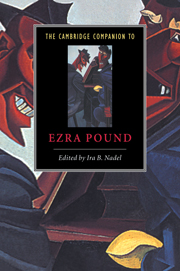Book contents
- Frontmatter
- 1 Introduction Understanding Pound
- 2 Pound and the making of modernism
- 3 Early poetry 1908-1920
- 4 Early Cantos I-XLI
- 5 Middle Cantos XLII-LXXI
- 6 Late Cantos LXXII-CXVII
- 7 Beyond The Cantos
- 8 The texts of The Cantos
- 9 Pound as critic
- 10 Pound as translator
- 11 Pound and the visual arts
- 12 Pound and music
- 13 Pound's politics and economics
- 14 Pound, women and gender
- 15 Pound and antisemitism
- Further reading
- Index
2 - Pound and the making of modernism
Published online by Cambridge University Press: 28 May 2006
- Frontmatter
- 1 Introduction Understanding Pound
- 2 Pound and the making of modernism
- 3 Early poetry 1908-1920
- 4 Early Cantos I-XLI
- 5 Middle Cantos XLII-LXXI
- 6 Late Cantos LXXII-CXVII
- 7 Beyond The Cantos
- 8 The texts of The Cantos
- 9 Pound as critic
- 10 Pound as translator
- 11 Pound and the visual arts
- 12 Pound and music
- 13 Pound's politics and economics
- 14 Pound, women and gender
- 15 Pound and antisemitism
- Further reading
- Index
Summary
“It is after all a grrrreat litttttterary period,” wrote Ezra Pound to T. S. Eliot with typical exuberance at the end of a famous 1921 letter accompanying major suggestions for revising Eliot's masterpiece The Waste Land (SL, 170). That mixture of showmanship, judgement, and genuine enthusiasm typifies Pound's contribution to the making of the great period of modernism, particularly when we remember its context of the brilliant reshaping of Eliot's original chaotic manuscript into the poem we now think of as one of the modernist monuments. Pound's remark also displays a canny awareness of literary politics, not least the potential of periodicity itself.
Besides the example of his own work, Pound helped to make modernism by supporting and encouraging other modernists and by helping to produce, distribute, and institutionalize modernist works. He presented the spectacle of “Pound the major poet devoting, say, one fifth of his time to poetry,” wrote Ernest Hemingway appreciatively in 1925. "With the rest of his time he tries to advance the fortunes, both material and artistic, of his friends . . . he defends them when they are attacked, he gets them into magazines and out of jail... sells their pictures . . . arranges concerts for them .. . writes articles about them . . . introduces them to wealthy women [patrons] . . . gets publishers to take their books." Those friends were the people whose work Pound admired.
- Type
- Chapter
- Information
- The Cambridge Companion to Ezra Pound , pp. 22 - 42Publisher: Cambridge University PressPrint publication year: 1999
- 2
- Cited by



